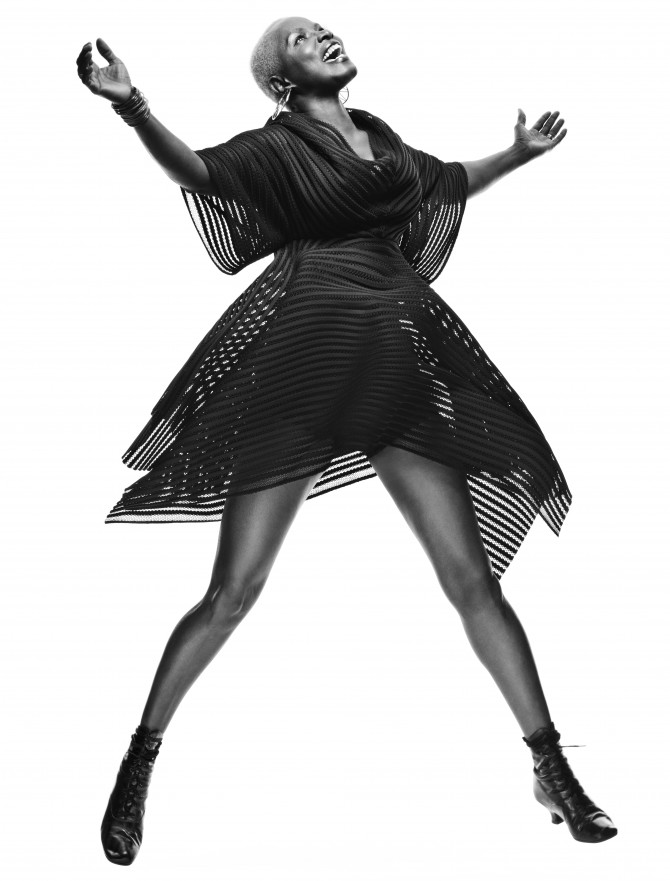The Global Soul: A Short Chat with Angelique Kidjo
By Johny Pitts
Depending on who you speak to, Angelique Kidjo is more than just a musical icon, but one of the ‘top 100 most inspiring women in the world’ (The Guardian), ‘one of the 40 most powerful celebrities in Africa’ (Forbes) ‘one of Africa’s 50 most iconic figures’ (BBC) and ‘Africa’s greatest living diva’ (NPR Radio), so as I sit in my little London flat, dialling Ms Kidjo’s home phone in her adoptive New York City, you’d forgive me for feeling a little anxious about our interview. But thankfully, she breaks the ice (literally, by the sounds of it), because as soon as I say hello, she asks, in a down to earth accent that is 75% West African, 25% New Yorker…
“What is the weather like in London? Is it as freezing as it is here in New York?”.
Not only is it cold, but it is raining too, I inform her, which makes her feel better, for the moment, until she remembers she has a gig here in the UK at London’s Southbank Centre on the 14th of this month- only a few days away. Angelique Kidjo has been a native New Yorker since 1997, and considering the weather certainly isn’t the attraction, I wonder what it is she loves so much about her adoptive home.
“Music brought me to New York, and, as they say, if you can make it here you can make it anywhere, so it just seemed like the right place to settle to have a career. But when I think about living in New York, I don’t think of it as living in a particular country, because the whole world awaits you here. It is a place that allows you to be yourself, where you can develop and make your own way. You have the capacity to transform yourself here, and I think that is the mood of America in general”
Talking to Angelique, her optimism doesn’t sound like that of the Panglossian American dream, but one born from ice cold resolve and an unflinching belief that we are the masters of our own destiny.
Born in Benin, West Africa, to a father of Fon heritage and a Yoruba mother, Kidjo’s musical journey has seen her travel the entire world, recording albums everywhere from Britain to Brazil, back in her native Benin and everywhere in-between. Political troubles forced Kidjo to relocate to Paris in the 80’s, before settling in New York. How, I wonder, does she manage to keep a sense of herself, and has she been embraced by what can at times be an insular African American community?
“Music helps me understand who I am, but I have had the opportunity to learn and grow as an individual from the places I have visited. African American culture and music is interesting to me, because the slaves who were brought here have a completely different history from the rest of the African diaspora. For one, they were denied access to drums! The slave masters were afraid of the capacity for communication with drums. Other parts of the diaspora were allowed to keep the drums, such as Brazil, so you see Africa expressed in a different way there. It is the little differences that make the change, and you have to realise that with the African American community- they had to develop a different way of communicating, which you can feel even now, a little. Africa is everywhere, just in different expressions, and I see the whole world as my home”
Among the chief communicators of African American heritage who influenced Kidjo’s style were James Brown, Jimi Hendrix, Otis Redding and Stevie Wonder, but she is keen to express a wider spectrum of influences…
One thing I have always felt lucky about is having access to music from all over the world. My father raised us to believe we can feel African, but also have a global outlook. I think listening to music from everywhere really made me see that just because I was African, it didn’t mean I had to be locked to one place. It’s interesting to grow up in Africa and then be able to travel so much, because when you’re black it’s a little more difficult. When I arrived to Europe for the first time I had all the cliches waiting there for me, all the colonial ideas about who I was supposed to be. But we Africans have to change that narrative, and we must take responsibility and tell our own stories, and tell them well!
I think of the quote by Jesse Jackson “Excellence is the best deterrent to racism”, and mention this to Ms Kidjo…
Yes I completely agree with that. If you just sit around nobody will come, and we must always ask ourselves as individuals and as a community “What are we doing to help ourselves?” I try not to look at the past too much. Growing up my parents taught me that success or failure is not a matter of skin colour. Don’t blame other people- learn from mistakes, because success is made of failures. I’m not special, I have just always tried to project myself in the future, and I believe in entrepreneurship. At heart, Africans have always been entrepreneurs.
Throughout the interview, I noticed myself constantly drifting back towards issues of identity through the lens of race and gender, but what seems to make Angelique Kidjo so powerful, is that whilst accepting the reality of these challenges, she has never allowed them to define her, and so the challenges were hurdles she hopped almost as if they didn’t exist. For instance, when I asked her about her intoxicating new album Eve, which is quoted as being a celebration of African woman, I wondered about the role African women play in 21st century feminism.
The album’s not about being a feminist, it’s simply about telling the narrative of African women. Through my travels in Africa, I have found that it is the women who have provided my map. Women are the backbone of Africa- the first to get up, the last to go to sleep. This isn’t to deny the work of African men, but it is important to realise that the more power and respect we give to African Women, the more power and respect we as a people will have on a global scale. If you look at most of the negative traditions holding Africa back, they are usually the traditions directly affecting women. These traditions are used as an excuse not to make a change, but how can a country profit from a society where men and women aren’t equal? How can a man really be powerful if a woman isn’t powerful? So it is important that the men take a stand against this, as well as the women. If African women flourish, everybody flourishes. I’m all about a new way of thinking, a way that I see in our children, who have more access to the wider world through computers. The world is changing, and we need to realise we are all a part of that change.
Angelique Kidjo is currently on tour. For more info about her European dates, visit www.kidjo.com
Thank you to Hugo at the Southbank Centre for arranging the interview.



